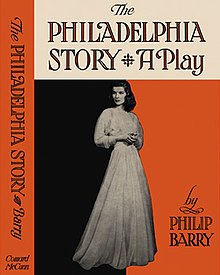
Joseph Cheshire Cotten Jr. was an American film, stage, radio and television actor. Cotten achieved prominence on Broadway, starring in the original stage productions of The Philadelphia Story (1939) and Sabrina Fair (1953). He then gained worldwide fame for his collaborations with Orson Welles films on three films, Citizen Kane (1941), The Magnificent Ambersons (1942), and Journey into Fear (1943), for which Cotten starred in and was also credited with the screenplay.

Katharine Houghton Hepburn was an American actress whose career as a Hollywood leading lady spanned over six decades. She was known for her headstrong independence, spirited personality, and outspokenness, cultivating a screen persona that matched this public image, and regularly playing strong-willed, sophisticated women. Her work was in a range of genres, from screwball comedy to literary drama, and earned her various accolades, including four Academy Awards for Best Actress—a record for any performer. In 1999, Hepburn was named the greatest female star of classic Hollywood cinema by the American Film Institute.

Spencer Bonaventure Tracy was an American actor. He was known for his natural performing style and versatility. One of the major stars of Hollywood's Golden Age, Tracy was the first actor to win two consecutive Academy Awards for Best Actor from nine nominations. During his career, he appeared in 75 films and developed a reputation among his peers as one of the screen's greatest actors. In 1999, the American Film Institute ranked Tracy as the 9th greatest male star of Classic Hollywood Cinema.
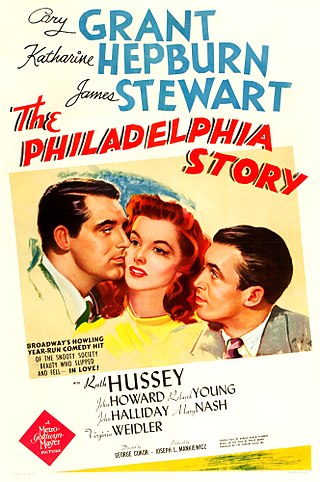
The Philadelphia Story is a 1940 American romantic comedy film directed by George Cukor, starring Cary Grant, Katharine Hepburn, James Stewart, and Ruth Hussey. Based on the 1939 Broadway play of the same name by Philip Barry, the film is about a socialite whose wedding plans are complicated by the simultaneous arrival of her ex-husband and a tabloid magazine journalist. The socialite character of the play—performed by Hepburn in the film—was inspired by Helen Hope Montgomery Scott (1904–1995), a Philadelphia socialite known for her hijinks, who married a friend of playwright Barry.

Raymond Hart Massey was a Canadian, later American, actor, known for his commanding, stage-trained voice. For his lead role in Abe Lincoln in Illinois (1940), Massey was nominated for the Academy Award for Best Actor. Among his most well-known roles were Dr. Gillespie in the NBC television series Dr. Kildare (1961–1966), Abraham Farlan in A Matter of Life and Death and Jonathan Brewster in Arsenic and Old Lace (1944).

Morning Glory is a 1933 American Pre-Code drama film which tells the story of an eager would-be actress and her journey to stardom, and her gains and losses. The picture stars Katharine Hepburn, Douglas Fairbanks Jr., and Adolphe Menjou, was adapted by Howard J. Green from a then-unproduced stage play of the same name by Zoë Akins, and was directed by Lowell Sherman. Hepburn won her first Academy Award for Best Actress for this movie. Morning Glory was remade in 1958 under the title Stage Struck.
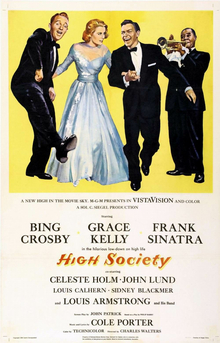
High Society is a 1956 American musical romantic comedy film directed by Charles Walters and starring Bing Crosby, Grace Kelly, and Frank Sinatra. The film was produced by Sol C. Siegel for Metro-Goldwyn-Mayer, and shot in VistaVision and Technicolor, with music and lyrics by Cole Porter.

Emmett Evan "Van" Heflin Jr. was an American theatre, radio, and film actor. He played mostly character parts over the course of his film career, but during the 1940s had a string of roles as a leading man. Heflin won the Academy Award for Best Supporting Actor for his performance in Johnny Eager (1942). He also had memorable roles in Westerns such as Shane (1953), 3:10 to Yuma (1957), and Gunman's Walk (1958).

Virginia Anna Adeleid Weidler was an American child actress, popular in Hollywood films during the 1930s and 1940s.
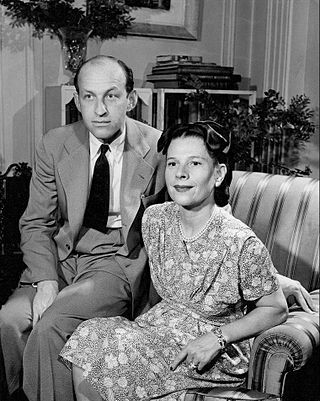
Garson Kanin was an American writer and director of plays and films.

Lux Radio Theatre, sometimes spelled Lux Radio Theater, a classic radio anthology series, was broadcast on the NBC Blue Network (1934–35) ; CBS Radio network (1935–54), and NBC Radio (1954–55). Initially, the series adapted Broadway plays during its first two seasons before it began adapting films. These hour-long radio programs were performed live before studio audiences. The series became the most popular dramatic anthology series on radio, broadcast for more than 20 years and continued on television as the Lux Video Theatre through most of the 1950s. The primary sponsor of the show was Unilever through its Lux Soap brand.

John Halliday was an American actor of stage and screen, who often played suave aristocrats and foreigners.

Pat and Mike is a 1952 American romantic comedy film starring Spencer Tracy and Katharine Hepburn. The movie was written by Ruth Gordon and Garson Kanin, and directed by George Cukor. Cukor directed The Philadelphia Story (1940) with Hepburn, and Cukor, Gordon and Kanin teamed with Hepburn and Tracy again for Adam's Rib (1949). Gordon and Kanin were nominated for the 1952 Academy Award for Best Original Screenplay. for their work on Pat and Mike.
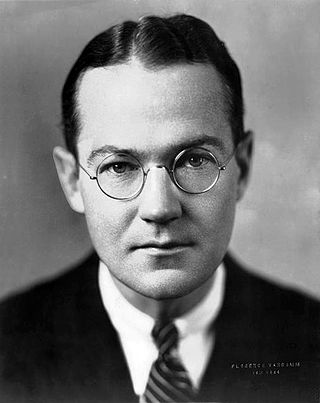
Philip Jerome Quinn Barry was an American dramatist best known for his plays Holiday (1928) and The Philadelphia Story (1939), which were both made into films starring Katharine Hepburn and Cary Grant.
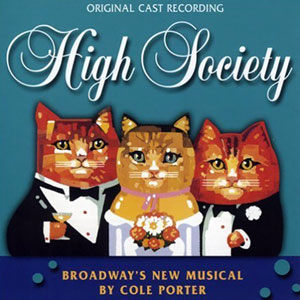
High Society is a musical comedy with a book by Arthur Kopit and music and lyrics by Cole Porter. Some updated or new lyrics were provided by Susan Birkenhead. The musical is based on Philip Barry's 1939 stage comedy The Philadelphia Story and the subsequent 1956 musical film adaptation, High Society, which features Porter's songs. The musical includes most of the music featured in the movie, along with several songs selected from other Porter musicals. It premiered on Broadway in 1998 and has since been revived. Another musical adaptation of the story had opened in London in 1987 with a different book by Richard Eyre.

Without Love is a 1945 romantic comedy film directed by Harold S. Bucquet and starring Spencer Tracy, Katharine Hepburn, and Lucille Ball. Based on a 1942 play by Philip Barry, the film's screenplay was written by Donald Ogden Stewart.
Helen Hope Montgomery Scott was a socialite and philanthropist whom Vanity Fair once called "the unofficial queen of Philadelphia's WASP oligarchy." She is most famous as the inspiration for Tracy Lord, the main character in the Philip Barry play The Philadelphia Story, which was made into the film of the same name as well as the musical film High Society. Scott was a longtime chairman and executive director of the Devon Horse Show and sponsored other events to raise money for the Bryn Mawr Hospital, her favorite charity. She was considered the epitome of Main Line high society and symbol of an aristocratic, free-spirited elegance.

Katharine Hepburn was an American actress of the 20th century, active in 44 feature films, 8 telemovies, and 33 stage plays over 66 years from 1928 and 1994.

Lenore Lonergan was a stage and film actress during the 1930s, 1940s and 1950s.
The Philadelphia Story is a 1959 American TV adaptation of the play The Philadelphia Story by Philip Barry. It was directed by Fielder Cook.
